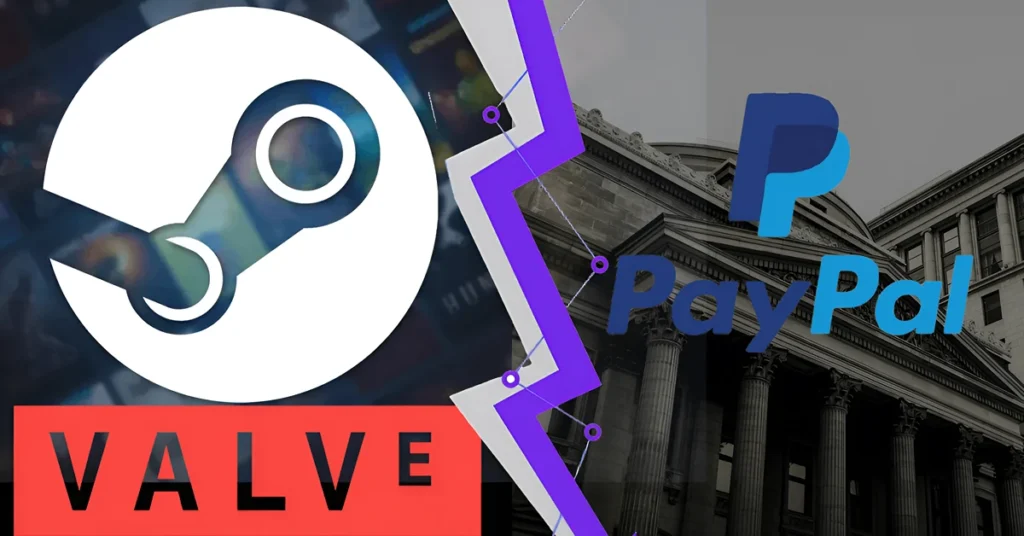PayPal Pulled from Smaller Markets
Valve has dropped PayPal as a Steam payment option in several countries.
This update affects users who have a local currency different from the euro, Canadian dollar, British pound, Japanese yen, Australian dollar, or US dollar.
The reason isn’t a technical defect.
An acquiring bank, which facilitates payments on behalf of PayPal, terminated the business with Steam for specific currencies.
Financial Pressure on Gaming Platforms
This step is part of a broader trend.
Banks have been putting pressure on gaming sites regarding specific forms of content.
Weeks prior to this move by PayPal, Visa, and Mastercard had followed suit.
Steam responded by updating its content rules and removing some games.
Stripe also discontinued payment services for itch.io when its banking collaborators expressed concerns.
The emphasis has been on games with sexual material, but the tactics go beyond direct censure. (Source: theguardian.com)
Valve’s Official Response
Valve has come out publicly with the problem.
They have confirmed they are seeking alternatives for affected users.
Options being considered are Steam wallet codes and a proprietary payments system.
These steps would reduce dependence on outside processors.
Valve has a history of discovering how to get around limits, as with their efforts on Steam OS to reduce dependence on Windows.
Related Article: 5 Free Steam Games You Can Download & Keep Forever – 2025
Targeting Small Markets Initially
The strategy targets smaller markets first.
By restricting payments where regulations are weak, processors and banks can gauge their power.
If little resistance exists, then the companies can extend such limitations to larger markets in the future.
Selective targeting spares backlash in those countries where the authorities may react swiftly.
It also enables companies to gauge user pushback prior to implementing wide-scale changes.
Government Initiatives in the US and Japan
Governments are recognizing this issue.
In the US and Japan, authorities are debating regulations to prohibit payment denials on the basis of “reputational risk.”
This is the tag usually employed by banks in defending the denial of service to some platforms.
Such laws strive for equitable access to financial services without any regard for the type of content.
Regulation, however, takes time, and smaller markets might not enjoy such protections anytime in the near future.
Accountability Issues in the Banking Sector
Institutions usually refuse to admit responsibility for such limitations.
They claim platforms like Steam choose to remove certain payment methods.
In practice, internal banking regulations may render impossible the availability of those methods on a platform.
The lack of clarity makes it challenging for the users and the regulators to figure out who really is responsible.
Effect on Smaller Regions’ Gamers
For the affected players, this poses instant issues.
Barring PayPal means fewer payment methods and more access barriers to the game’s purchase.
Some of the users might not possess credit cards or any other form of accepted payments.
In smaller markets, these gaps can prevent people from making purchases entirely.
This means differential access to the same platform on the basis of geography.
Banks as Content Gatekeepers
The problem also reveals the extent of banks’ and payment processors’ power over electronic commerce.
By restricting the transaction avenues, indirectly, they can decide what information the users receive.
This type of economic control is more difficult to challenge than direct governmental censorship.
They have to comply or lose the privilege of handling payments altogether.
Possible Evolution into Valve’s Proprietary Payment Solution
Valve’s possible transition into being a payments system by itself could change the equation.
If they succeed, it could inspire other companies to follow.
This would diminish the power of established financial institutions over information on the internet.
It may also drive the sector into more decentralized payment platforms.
Elon Musk’s Xpay: A Future Competitor
There is interest beyond the gaming sector as well.
Elon Musk has discussed “Xpay,” a payments feature associated with his X platform.
If adopted, this could become yet another alternative for businesses that want to sidestep mainstream processors.
Whether the same banking pressures would face Xpay remains to be seen.
But its mention shows there is demand for alternatives.
Short-Term and Long-Term Measures
They must wait for new announcements for the time being, affected Steam users.
Valve will release new replacement payment methods in the near future.
Wallet codes are the most likely short-term solution since they work independently of credit card networks.
In the long run, a direct payments scheme would afford more control over transactions to Valve and insulate users from arbitrary service modifications.
A Warning for Digital Platforms
This exodus of PayPal is a bellwether for online platforms.
It shows how payment processors can influence policy without public debate.
It also underscores the speed with which access to global markets can be upended by the actions of a few financial institutions.
For users, it is a reminder to have backup payment methods ready.
Essential Facts
- PayPal dropped for Steam in countries outside major currency zones
- Triggered by the acquiring bank ending the deal with Steam for those currencies
- Part of a broader pattern of banks influencing content policy on gaming platforms
- Mastercard, Visa, and Stripe have followed suit in recent years
- Small, less-regulated markets are targeted first to test influence
- Valve is working on alternatives such as wallet codes and perhaps even its own payments platform
- US and Japan are considering rules to stop banks from blocking services based on reputation concerns
- Financial companies deny direct responsibility, making accountability harder
- Elon Musk is developing “Xpay” as another possible alternative
Ongoing Conflict
This platform war between services such as Steam and financial institutions continues.
Its decision will determine the way games are bought and paid for globally.
If banks and processors continue to restrict payment options, more companies may seek independence in handling transactions.
If the government acts in haste, such restraints can have constitutional boundaries.
Either way, the battle over who has the right to control access to online content isn’t letting up.

